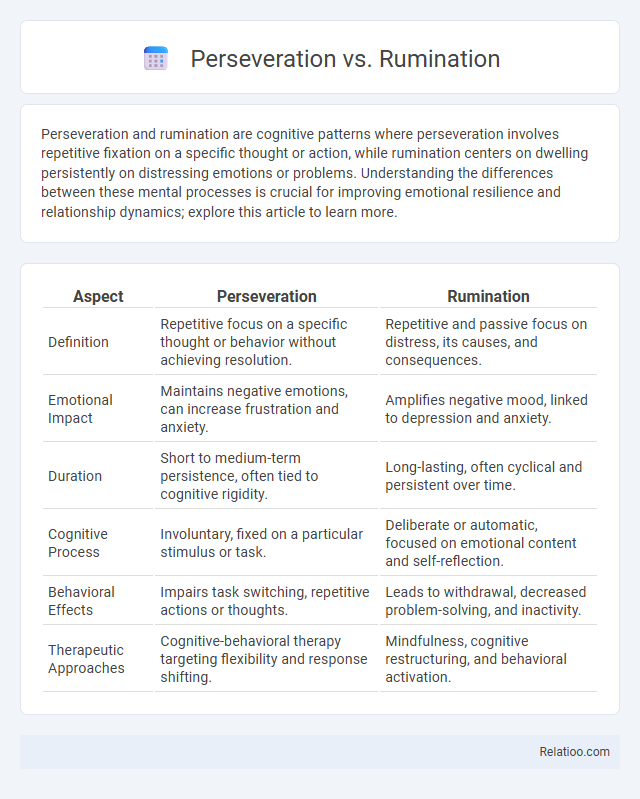Perseveration and rumination are cognitive patterns where perseveration involves repetitive fixation on a specific thought or action, while rumination centers on dwelling persistently on distressing emotions or problems. Understanding the differences between these mental processes is crucial for improving emotional resilience and relationship dynamics; explore this article to learn more.
Table of Comparison
| Aspect | Perseveration | Rumination |
|---|---|---|
| Definition | Repetitive focus on a specific thought or behavior without achieving resolution. | Repetitive and passive focus on distress, its causes, and consequences. |
| Emotional Impact | Maintains negative emotions, can increase frustration and anxiety. | Amplifies negative mood, linked to depression and anxiety. |
| Duration | Short to medium-term persistence, often tied to cognitive rigidity. | Long-lasting, often cyclical and persistent over time. |
| Cognitive Process | Involuntary, fixed on a particular stimulus or task. | Deliberate or automatic, focused on emotional content and self-reflection. |
| Behavioral Effects | Impairs task switching, repetitive actions or thoughts. | Leads to withdrawal, decreased problem-solving, and inactivity. |
| Therapeutic Approaches | Cognitive-behavioral therapy targeting flexibility and response shifting. | Mindfulness, cognitive restructuring, and behavioral activation. |
Understanding Perseveration and Rumination
Perseveration involves the uncontrollable repetition of a response, phrase, or behavior even when it is no longer appropriate, often linked to neurological conditions like brain injury or autism. Rumination consists of persistent, repetitive thoughts about distressing situations or emotions, commonly associated with depression and anxiety disorders. Differentiating perseveration and rumination is crucial, as perseveration is a behavioral repetition tied to cognitive deficits, while rumination is a cognitive process related to emotional regulation and psychological distress.
Key Differences Between Perseveration and Rumination
Perseveration involves the uncontrollable repetition of a response, such as words, actions, or thoughts, often linked to neurological conditions like autism or brain injury, whereas rumination refers to persistent and passive focus on negative emotions or problems, commonly associated with depression and anxiety. The key difference lies in the cognitive aspect: perseveration is a behavioral repetition caused by brain dysfunction, while rumination is a cognitive process driven by emotional distress and maladaptive thinking patterns. Understanding these distinctions is crucial for targeted therapeutic interventions in mental health and neuropsychological disorders.
Psychological Mechanisms Behind Perseveration
Perseveration involves the uncontrollable repetition of a particular response or behavior despite the absence of a stimulus or change in context, often linked to dysfunctions in the prefrontal cortex and impaired executive function. Rumination is characterized by repetitive, passive focus on distress and its possible causes or consequences, frequently associated with depressive disorders and is mediated by increased activity in the default mode network. Unlike rumination, perseveration reflects a cognitive inflexibility predominantly seen in neurological conditions such as traumatic brain injury or frontal lobe damage, highlighting distinct neural pathways and psychological mechanisms underlying these behaviors.
The Science of Rumination: Causes and Effects
Rumination involves repetitive, passive focus on distress and its causes, often linked to depression and anxiety disorders, distinguished from perseveration which is the repetitive continuation of a response despite changing stimuli or rules. The science of rumination identifies brain areas like the prefrontal cortex and amygdala as key players, showing how persistent negative thoughts disrupt emotional regulation and cognitive flexibility. Your understanding of these mechanisms helps in recognizing when rumination becomes maladaptive, informing strategies to interrupt these cycles for better mental health outcomes.
Cognitive and Emotional Impacts
Perseveration involves the repetitive continuation of a response or behavior despite the absence of a stimulus, often linked to neurological conditions impacting cognitive flexibility. Rumination centers on persistently thinking about distressing situations or emotions, intensifying feelings of anxiety and depression by trapping Your mind in negative thought cycles. Understanding the differences in cognitive and emotional impacts between perseveration and rumination can guide targeted interventions to improve mental health and cognitive function.
Perseveration in Mental Health Disorders
Perseveration in mental health disorders refers to the uncontrollable repetition of a response, word, or behavior, often seen in conditions like autism spectrum disorder, schizophrenia, and obsessive-compulsive disorder. Unlike rumination, which involves repetitive negative thinking, perseveration is characterized by persistent fixation on a particular topic or action regardless of context or appropriateness. Understanding how perseveration impacts your cognitive and emotional functioning can guide targeted therapeutic interventions to improve daily living and mental well-being.
Rumination’s Role in Depression and Anxiety
Rumination involves repetitive, passive focus on distress and its causes, which intensifies symptoms of depression and anxiety by trapping Your thoughts in negative loops. Unlike perseveration, characterized by the uncontrollable repetition of specific words or actions often seen in neurological conditions, rumination centers on emotional processing and self-critical thinking. Understanding the cognitive impact of rumination helps in developing targeted therapies that reduce its role in worsening mood disorders.
Strategies to Manage Perseveration
Perseveration involves the uncontrollable repetition of a response, often seen in neurological conditions, while rumination refers to repetitive, negative thinking linked to mood disorders. Strategies to manage perseveration include cognitive-behavioral therapy techniques, environmental modifications to reduce triggers, and using distraction or redirection methods to interrupt repetitive patterns. Your ability to recognize early signs and implement these approaches can significantly improve daily functioning and communication efficiency.
Effective Techniques to Reduce Rumination
Effective techniques to reduce rumination include cognitive-behavioral strategies such as mindfulness meditation, which helps individuals detach from repetitive negative thoughts and focus on the present moment. Behavioral activation encourages engaging in meaningful activities to disrupt cyclical thinking patterns, while cognitive restructuring targets and challenges distorted beliefs fueling rumination. Incorporating relaxation techniques, journaling, and seeking social support further enhances the ability to manage intrusive ruminative thoughts and improve mental well-being.
When to Seek Professional Help
When you notice persistent, repetitive thoughts that interfere with daily functioning, it may indicate perseveration, rumination, or obsessive behaviors requiring professional evaluation. Seek help if these patterns cause significant distress, impair your ability to complete tasks, or contribute to anxiety and depression symptoms. Early intervention from a mental health professional can provide strategies tailored to manage and reduce these cognitive challenges effectively.

Infographic: Perseveration vs Rumination
 relatioo.com
relatioo.com